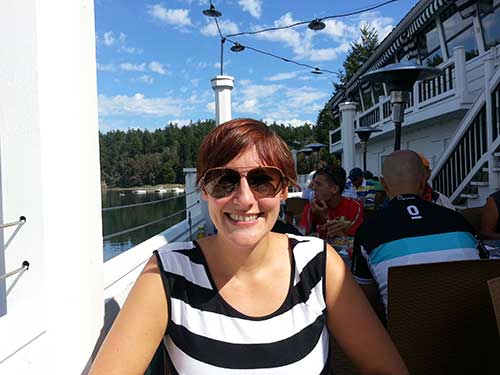This content was published: February 24, 2020. Phone numbers, email addresses, and other information may have changed.
Using an “autobiography” assignment to combat a deficit mindset
Posted by Peter Seaman
 Heather Mayer, former Rock Creek TLC coordinator, contributed this post as part of our Online Faculty Summit: Encore Presentations.
Heather Mayer, former Rock Creek TLC coordinator, contributed this post as part of our Online Faculty Summit: Encore Presentations.
When I first started teaching history, I had a deficit mindset as I approached my students. They didn’t know US history, I thought. Or if they did, they only knew a sugarcoated, simplistic version of it. This deficit lens kept me from appreciating the skills, assets, and knowledge that my students brought into the classroom. But in an online setting, how could I learn more about where my students came from and what they already knew? I already had them introduce themselves to the class in the discussion board, which was interesting, but not usually very deep.
The solution for me was to develop a “History Autobiography” assignment due in the first week. It gives students a way to share what they want to share and I’m blown away every term by what I learn about them that I wouldn’t have known from their photos or their class introductions.
This assignment could easily be applied to most disciplines. What kinds of questions might you want to ask your students? How can you introduce them to disciplinary thinking through self-reflection? What kinds of assumptions do you make about your students before class begins? How can they connect their lived experience to your discipline?
Here are the assignment instructions:
For this assignment you are going to write a short autobiography of how you have been socialized into the story of the United States. In other words, you are going to tell me about how you have learned about the story of this country. The autobiography should be 1-2 pages long, double-spaced. You also have the option of submitting the assignment as an audio or video recording.
Some questions to think about:
- What was the story of the United States that you learned in school?
- Did the history you learned in school reflect what you learned from your family, friends, and community?
- How has the media influenced your understanding of US History?
- Does the study of US History leave you feeling empowered or disempowered? Why?
- Have you seen your own story reflected when you have learned the history of the United States?
- If you did not grow up in the United States, how did the history of the US intersect with that of your home country? What were the impressions you had of the United States not living here?
This does not need to be an overly-formal assignment. The goal is to get you thinking about how you have learned US history in the past.
If you have completed this assignment in one of my courses before, please include reflections on how your understanding has changed by studying US History at the college level. Or, you can choose to write about a current event and how your understanding of it has been influenced by the history you learned in the previous course.
As we think about new assignments, we always need to be mindful of our own workload and how it fits into what we are already doing in our courses. It would be easy for me to read these and write paragraphs in response to each one, but then it would not be sustainable for me. Unless there is something concerning in the autobiography that needs to be addressed (and there have been a few of those), in response to each submission I simply write “Thank you for sharing your story,” and each person gets full credit if they submit.
I encourage you to give this assignment a try, and I hope that your appreciation of what your students bring into your classroom will then impact how you approach other parts of your course. At the very least, it serves as an amazing reminder of the breadth of experiences and perspectives in each of our classrooms.
If you liked this, feel free to check out more of our recorded encore presentation topics and keep an eye out for future offerings this Spring!


What an awesome way to move past assumptions, create an in-depth engagement for the students (and instructor) all while solving a super pragmatic question: what is the student entering the classroom with? Thanks Heather for yet another pearl!
BRILLIANT! Your method not only engages and then can act to help flip a deficit (negative) mindset, it should also prime your students to carry that assignment in their minds throughout your course.
I fully agree that your method could be adapted for a wide variety of other courses. We’ve had a similar success every term in our GRN175 The Aging Mind with the first-week discussion (below) where a student thinks and writes about one person. The richness of their posts seems to increase each term as they so often recognize that they’ve already been exposed to a powerful and positive image of an older person.
Thank you.
***
GRN175 Discussion 1 – Keeping in mind the trajectory that human longevity is taking, post a comment answering the following questions:
(1) Give us the first name of the OLDEST person you have ever met. This could be yesterday or when you were much younger. It could be a relative or a friend or a neighbor or someone you only met once but still remember meeting that particular elder. Tell us the age (or best guess) of that person when you last were with her or him. Next, calculate as close as you can the year that this person was born.
(2) Briefly describe the circumstances and describe your recollections about that person, what you observed, heard, whether you had a conversation, etc.